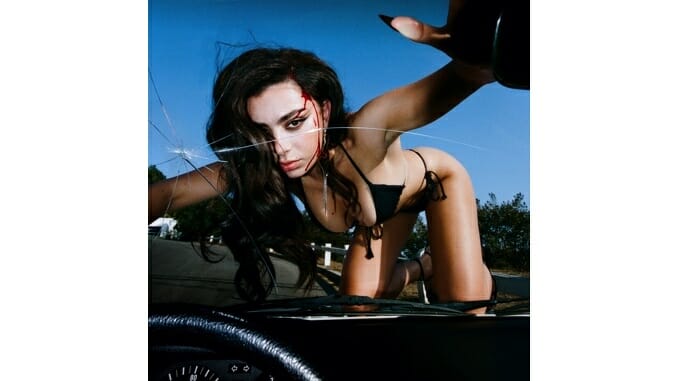Charli XCX Follows Her Pop Passion on the Uneven CRASH
The popstar's latest album is not her lowest point, but it is her first misstep

When the world shut down in March 2020, Charli XCX did what many of us did: coped through creation, keeping herself busy. In what she couched as a collaborative effort to connect with her fans, she made an album in just two months. That album, how i’m feeling now, marked a change for the popstar. While Charli was known as a maximalist, bent on creating futuristic, high-concept pop, this showed a more vulnerable side of her. It’s not the record that Charli thought would follow her 2019 effectively self-titled record, Charli. Much of the material that would become her fifth record was written long before. CRASH is her attempt at channeling what she calls her inner “ultra popstar,” and was to be accompanied with a massive tour and lots of videos—all things that were impossible in 2020. As things have moved slowly towards a tentative semblance of normalcy, the time has come for Charli to unleash this upgraded version of herself on the world.
CRASH is the most conventional entry in the singer’s repertoire, eschewing the experimental nature of her prior work at every juncture. Fans hoping for something in line with the 2017 mixtape Pop 2 will find little to latch onto; CRASH is much more a survey of her earlier music. Songs like “Move Me” evoke the rap-sung style of “What I Like” and “Grins” from 2013’s True Romance. The confectionery production of “Yuck” would feel at home on 2014’s Sucker. At her core, Charli is an admirer of pop music and its history, and wanted the record to reflect that. She recently told Rolling Stone UK that she’d “never actually made a major label album in the way that it’s actually done” and wanted to do it for the last in her contract. The 12 tracks that make up CRASH traverse pop history, folding in the drama of Italo disco, the grandeur of ’80s pop and the disaffected sleaze of the late aughts. For an artist often praised for the forward-thinking style of her craft, it’s fascinating to see her looking backward.
Charli’s appreciation for the music of her predecessors breaks through on a handful of songs that so heavily rely on samples, it feels more accurate to call them interpolations. “Used to Know Me,” a grinding track that borrows from the 1990 house hit “Show Me Love” by Robin S., comes towards the record’s end, and while catchy, offers little substance. “Beg for You,” which features Rina Sawayama, makes the inspired choice to build on Swedish singer September’s cult classic “Cry for You.” While great on paper, “Beg for You” is a song burdened by its own potential and sounds unfinished. Sawayama shines in her verse, but there’s no interplay between her and Charli, putting an artificial distance between them. While the song was likely completed without the two meeting, Charli’s no stranger to working in isolation and pulling it off. Both “Beg for You” and “Used to Know Me” suffer from the album’s most prominent flaw: They’re too short to feel satisfying. Perhaps most harmed by this habit is “Baby,” a high-energy piece of dance-floor fodder and the record’s fourth single. Should its melody catch you, you might not notice how aggressively simple it is. Repetition is a key component of a pop song, but “Baby” offers little else. While “Baby” does technically have a bridge, what’s there doesn’t serve any purpose. It doesn’t introduce any needed variation, nor does it give the listener a moment to catch their breath. Like much of the record, it clocks in at under three minutes and would be better served if given more time to make its case.
-

-

-

-

-

-

-

-

-

-

-

-

-

-

-

-

-

-

-

-

-

-

-

-

-

-

-

-

-

-

-

-

-

-

-

-

-

-

-

-








































